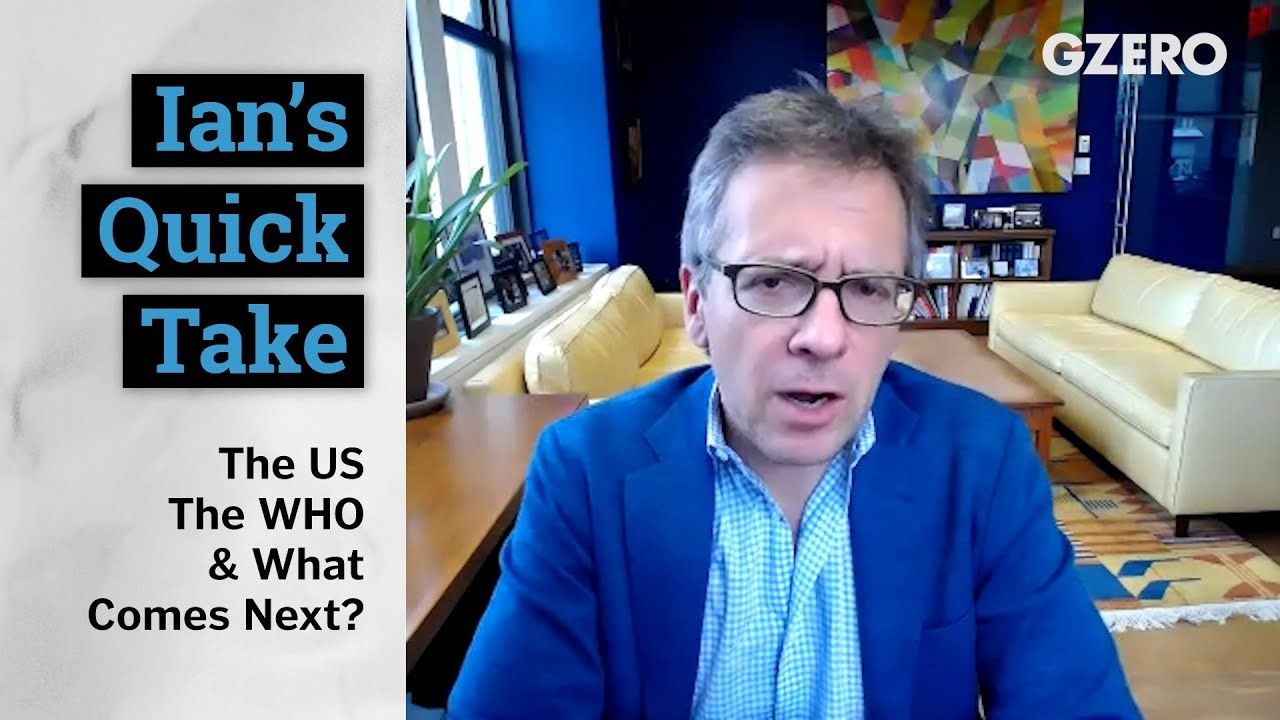Science & Tech
Ian Bremmer: Trump vs the WHO & Political Distractions from Effective Crisis Response

Ian Bremmer: Trump vs the WHO & Political Distractions from Effective Crisis Response | GZERO Media

The big news has been the Americans getting into a fight with the World Health Organization, with the Chinese for the original cover up, complicity. We don't want to be beating up on the World Health Organization. They are there to fight a pandemic. As Rumsfeld said about war, you don't fight a pandemic with the W.H.O. you want. You fight a pandemic with the W.H.O. you have. This is the W.H.O. we have.
And are they as capable as I'd like? No. Do they have strong leadership that I'd like and independent? No. Overly bureaucratic, willing to defer to power, covering up for the Chinese, refusing to even talk to the Taiwanese. All bad, right? Would I defund them right now, when we really need their frontline capacity, especially on the ground in the poorest countries that don't have access to the health care and doctors that we do here in New York City? Yes, we absolutely need them. Trump picking a fight, withholding funding in the middle of this pandemic is unconscionable and will undermine American leadership with a lot of those countries. But then again, we. I really care about a lot of those countries. And that's true of Americans at-large. And it's obviously true of Trump, who's our president.
This is not a surprise. It's disappointing. Trump has been on the back foot in terms of investigations and hearings for years. From the Mueller investigations, to the impeachment proceedings, all of the hearings have been against Trump. He doesn't like that. With the elections coming up, we're going to have hearings against the World Health Organization, China. They'll talk about how maybe, not only was there a cover up, but maybe coronavirus came from a lab in Wuhan. Not engineered, zoonotically from bats and pangolins, but they didn't have suitable security constraints in this lab, and it escaped.
It's not inconceivable. There is no hard evidence. But the possibility is one more thing that can be used politically to divert attention away from the Trump administration and the 60,000 or more deaths that we'll see in the United States on the back of coronavirus. The 15 to 20 percent unemployment. I understand why the politics of attacking the W.H.O. and China in an election cycle is a valuable, even vital thing for President Trump to do.
We see this with the early campaign ads against Biden, calling him Beijing Biden. Same playbook. Is that a reasonable thing to do? Is it useful for the country? Is it useful for US-China? Absolutely not. Is that the concern? No. If we weren't playing politics, both inside the United States as well as other democracies and China and globally, we could respond much more effectively to this crisis. We would have fewer deaths on our hands. We would have less economic dislocation. The politics are maximally dysfunctional, in part because of a very divisive leadership in the US, in part because it's an election cycle, in part because of the disenfranchisement and anti-establishment sentiments across both sides of the political spectrum in the US and among advanced industrial democracies and in emerging market democracies, and because the Chinese have no trust for the Americans, the Americans have no trust for the Chinese, and they don't want an American led global system, they promote state capitalism and authoritarianism - the political dysfunctionality in responding to the coronavirus crisis is massive.
It's going to cause a lot more hardship. We could be in such better shape if we could get the politics out. It's hard. We're in a GZero world, I don't want to be the GZero world. That's where I think we are. How do we get out of it? My answer is, we're not going to get out of it in the near term. It's going to intensify because inequality and mistrust is going to intensify. The lack of interdependence between the US and China in particular, is going to intensify. That does lead to much more political dysfunction domestically and globally.
I am deeply grateful that we are getting through this in terms of human cost of the virus directly in the United States and in Europe. I'm deeply grateful that the health care system isn't falling apart. But the economic impact, which is also real human impact that we're going to experience for a very long time, everywhere, is going be a lot greater.
5: US President Donald Trump added five new countries – Burkina Faso, Mali, Niger, South Sudan, and Syria – to the list of nations banned from traveling to the US.
With the release of its National Security Strategy, the Trump administration has telegraphed how the US intends to engage with allies, and what it expects from them.